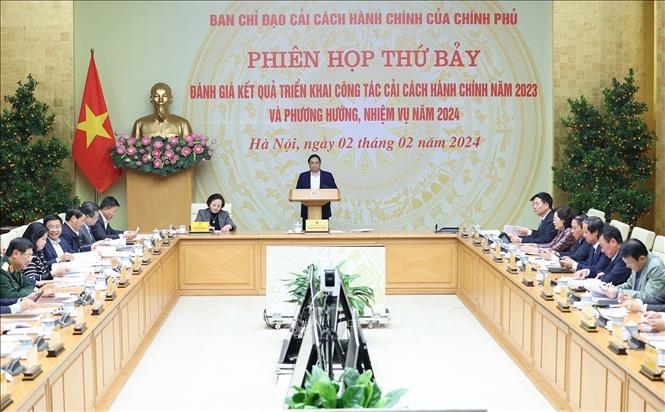 |
| Prime Minister Pham Minh Chinh chairs the seventh meeting of the Government’s Steering Committee for Administrative Reform in Hanoi on February 2 (Photo: VNA) |
PM Chinh, who is also head of the steering committee, underscored that the Party and State view the acceleration of administrative reform as a pivotal stride toward establishing a socialist rule-of-law State, one that serves its citizens with utmost professionalism, efficiency and effectiveness.
Reflecting on the 2023 achievements, he lauded the issuance of major documents, mechanisms, and policies, notably the Law on Identification, the revised Law on Electronic Transactions and the Law on Real Estate Business, alongside special development policies for localities and sectors.
He noted that ministries and agencies had cut and simplified 628 business regulations and 100% of localities had completed the rearrangement of their agencies. Public finance reform received due attention, resulting in an 8.12% increase in State budget revenue over estimates despite tax exemptions, reductions, extensions, and waivers totaling nearly 194 trillion VND (8 billion USD). Additionally, 560 trillion VND has been set aside thanks to efforts to cut spendings and increase revenues, ensuring the funding for salary reform from 2024-2026.
The PM emphasised reform in six fields, in which institutional reform must focus on removing legal hindrances to production and trade, while administrative reform should prioritise procedural simplification, decentralisation of authority. The building of a streamlined and effective apparatus must be the focus of the State administrative apparatus reform, and reform of public affairs should centred on strengthening administrative discipline and ethics of public servants.
Regarding public finance, reform efforts should focus on increasing revenue and reducing regular spending to spend more on development investment, along with fighting corruption and negative phenomena. In the realm of e-government development, the leader urged advancing digital government, digital citizenship and a digital society.
He required ministries, agencies, and localities to prioritise resources for refining legal frameworks, improving law enforcement effectiveness, and eliminating bottlenecks in mechanisms and policies supporting production and trade.
The PM stressed the need to eliminate unnecessary, unfeasible, unclear, indefinite and unsuitable business conditions.
As the steering committee prepares to unveil its action plan for 2024 this month, he instructed all members to quickly roll out tasks and solutions, thereby contributing significantly to the realisation of socio-economic development targets for 2024 and beyond./.